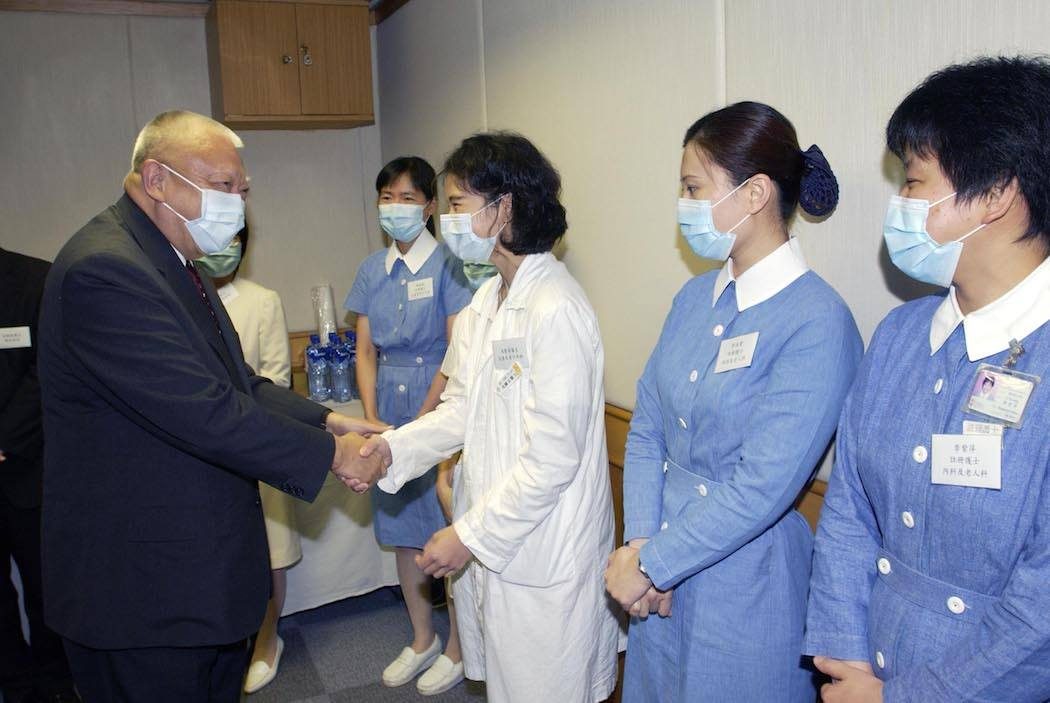On June 23, 2003, the World Health Organisation removed Hong Kong from its list of “infected areas” of the severe acute respiratory syndrome (SARS) – a disease that killed 299 people in the city, including eight healthcare workers.
Fourteen years later on the same day, dozens of people gathered at the SARS memorial garden in Hong Kong Park to pay tributes to the eight workers and other medical professionals for remaining at their posts during the deadly epidemic.

“They are true heroes who protected Hong Kong,” a student representative said.

SARS was traced to an outbreak in neighbouring Guangdong province in November 2002. Hong Kong did not know about the disease, as China’s press had initially been discouraged from reporting about the mysterious virus.
The epidemic broke out in Hong Kong in February 2003 following the visit of a mainland Chinese doctor who had already developed symptoms. He passed away two weeks after checking into Kowloon’s Metropole Hotel.

Other residents on the same hotel floor soon developed SARS symptoms. The outbreak in Hong Kong eventually infected 1,755 people, including some 360 hospital workers.
At the time, the SARS epidemic was considered the darkest period in Hong Kong’s history since the 1997 handover.

On Friday evening, attendees placed white roses and tulips at the statues of the medical workers who died during the epidemic.
A moment of silence was held in their honour.

Hong Kong National Party leader Chan Ho-tin, who was present at the event, told HKFP that the selfless attitude of the medical professionals demonstrated the Hong Kong spirit.
“You may call them silly for sacrificing themselves for others. But this professionalism is what sets Hong Kong apart from China,” he said.

Chan, who was a secondary school student at the time, said he was moved by the stories of patients, medical workers and their families.
“To an extent I also resonate with them,” he added. “I feel a bit like I am sacrificing myself for Hong Kong. I need to learn from them.”

Then-chief executive Tung Chee-hwa was heavily criticised for his poor leadership and slow response during the outbreak. Last week, he thanked Beijing for “taking care of Hong Kong” during the epidemic in an interview with Chinese state media CCTV.

Chan called Tung “shameless” and said it shows the importance of having annual commemorations. “The Chinese Communist Party likes to rewrite history. Events like this are important for us to defend history and carry on the spirit of the people before us.”
University of Hong Kong Students’ Union President Wong Ching-tak told HKFP that people should not shift the focus of the SARS incident – the sacrifices of Hong Kong medical staff – “just to please the Chinese government.”

Former Youngspiration lawmaker Yau Wai-ching also said the Chinese government’s attempt to cover up the outbreak left a strong mark on post-handover Hong Kong.
“It says a lot about how the Chinese Communist Party treats its people in Guangdong and even Hong Kong people,” she told HKFP.

Yau was a Primary Six student at the time. She recalled having to wear surgical masks and worrying that she or her family might contract the disease.
“Epidemic is scary not just because of the disease itself, but also because it impacts an entire community and even the mentality of a generation of people,” she said.

See also: In Pictures: Hong Kong during the 2003 SARS epidemic
Friday’s attendees were mostly young people. Yau said it was likely because the event was promoted mainly on social media.

“I believe a lot more people would turn up if other means of publicity were explored, because the SARS epidemic is such an important memory for this generation of Hongkongers,” she said.
